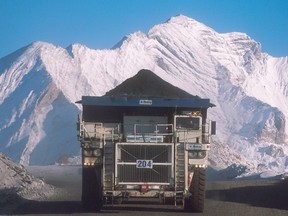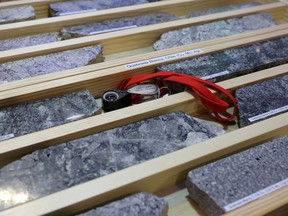Teck-Glencore clash represents contrast in strategies for confronting energy transitions

Article content
Teck Resources Ltd. had a novel rationale for rejecting Glencore Plc’s US$23-billion takeover proposal this week: the Vancouver-based miner said the Swiss commodities giant was too dirty and Teck’s leaders didn’t want Glencore’s commitment to fossil fuels rubbing off on the long-term value of the company.
Advertisements 2
Article content
As chief executive Jonathan Price put it in a press release, Glencore’s thermal coal assets and oil trading would “negatively impact the value potential of Teck’s business.”
Article content
Price has said repeatedly that Teck can only realize its full potential by separating its coal and copper assets, and shareholders will vote later this month on a plan to cleave its metallurgical coal assets into a separate entity.
By contrast, Glencore’s proposal offers Teck shareholders an immediate 20 per cent premium. That kind of opportunity would normally spur at least a debate, but not at Teck. Most analysts noted that Teck’s board was able to reject the proposal immediately because its dual class share structure endows class A shares with 100 votes a piece, giving a few key shareholders — namely, the Keevil family — sway over the company’s strategy.
Article content
Advertisements 3
Article content
The Teck-Glencore clash represents a contrast in strategies for confronting the energy transition.
Teck’s pitch that the value of its copper assets would be degraded if paired with fossil fuels is a bet on the long term, as a world powered by electricity will need more of the metals needed to build electric vehicles and wind turbines, and steadily less of the stuff that generates outsized carbon emissions.
Glencore, on the other hand, is promising an immediate financial return. The situation exposes a vulnerability in the thesis that markets will directly publicly traded companies to lead the green transition: For many executives, and most analysts, the time value of money — meaning a dollar today is worth more than a dollar tomorrow — still represents the first rule of investment.
Advertisements 4
Article content
“There’s this theoretical notion of the future and an energy transition,” said Bruce Lourie, president of the Ivey Foundation, a private charitable group dedicated to supporting Canada’s transition to a net-zero future. “Then there’s the present and in the present you can make a lot of money” from fossil fuels, he said.
As a result, Lourie noted that most executives of publicly traded companies cannot look more than a few months into the future when thinking about how to maximize profits. “They all have to be focused on quarters,” he said. “But it’s an (energy) transition that’s going to take 20 years.”
‘Surprisingly lacklustre’
For now, most analysts note that Norman Keevil, Teck’s chairman emeritus, whose family foundation controls a chunk of class A shares, has backed the board’s decision to reject Glencore’s offer and supports Price’s plan to separate metallurgical coal from copper.
Advertisements 5
Article content
Teck’s class A and class B shareholders are scheduled to vote April 26 on whether to approve the plan, which would create Teck Metals, a copper mining company, and Elk Valley Resources, a separate entity that holds Teck’s coal assets.
Price has said this is necessary because the energy transition has changed the investment landscape. Teck used to receive a premium because it produced a diverse array of commodities, but “in recent years, the investor base for base metals and steelmaking coal businesses have become increasingly diverging,” Price said on Feb. 23.

That put Price and Glencore chief executive Gary Nagle on opposite ends of the energy transition spectrum: electrification is expected to increase demand for copper, while demand for metallurgical coal should decline as steel plants convert to electric arc furnaces.
Advertisements 6
Article content
Analysts often account for this difference by applying higher multiples to a copper business because of the growth potential. Citi Research’s Alexander Hacking, who covers Teck, wrote on Feb. 21 that base metals companies trade at a share price roughly equal to 6.5 to 7.5 times estimated cash flow whereas a metallurgical coal business sits closer to 3.5.
But Teck’s share price declined in the weeks after it was announced in February that it was intended to become a standalone metal base miner focused on copper
“Teck has been surprisingly lackluster since the announcements,” Hacking wrote.
‘Unnecessarily complicated’
Hacking attributed this to a variety of technical factors, including that the planned separation — which he described as “unnecessarily complicated” — was not an immediate catalyst and would instead link Teck’s metals business to coal revenues for roughly six years. Under the plan, the coal company will send quarterly payments equal to roughly 90 per cent of its cash flows to Teck’s metals business.
Advertisements 7
Article content
Hacking noted that Teck faced a series of cost overruns at its QB2 project — its new copper mine in Chile, which recently started production.
“This has been paid for by extremely strong coal meth prices,” he wrote.
-

Would ‘be a pity’ for Glencore to lose Teck to a foreign miner
-

Teck Resources rejects Glencore’s takeover bid
-

Teck produces first bulk of copper from its largest project in Chile
Lourie said this is the rub in the energy transition: it won’t happen overnight and fossil fuels continue to be lucrative. But eventually as companies invest in alternatives, some assets may be stranded, and so there is an incentive for companies to maximize profits from fossil fuels now.
“They’re going to make as much money as they can until they very end, then they’re going to pull out,” Lourie said.
In channeling its coal profits into a copper business, Teck is trying to chart a different path.
• Email: [email protected] | Twitter: GabeFriedz



Comments
Postmedia is committed to maintaining a lively but civil forum for discussion and encourages all readers to share their views on our articles. Comments may take up to an hour for moderation before appearing on the site. We ask you to keep your comments relevant and respectful. We have enabled email notifications—you will now receive an email if you receive a reply to your comment, there is an update to a comment thread you follow or if a user you follow comments. Visit our Community Guidelines for more information and details on how to adjust your email settings.
Join the Conversation